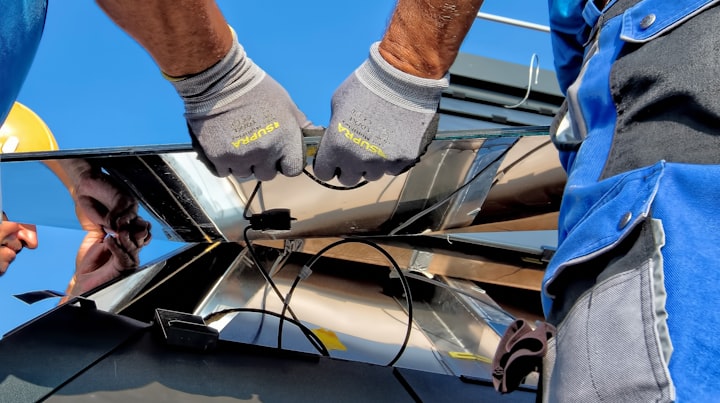Grid-Tied Vs. Off-Grid Solar Power System - Which Is Better?
Grid-Tied Vs. Off-Grid Solar Power System - Which Is Better?

Harnessing the power of the sun to generate electricity has proven to be an environmentally friendly and cost-effective approach for many individuals and organizations. Solar power systems can significantly reduce or eliminate reliance on traditional energy sources, offering long-term benefits.
However, before making the switch to solar energy, it is essential to understand the two primary types of solar power systems: grid-tied and off-grid.
So which one is better?
Reliable solar panel installation companies like Dandelion Renewable offer both grid-tied and off-grid solar systems. Both options have their advantages and considerations, and the choice depends on various factors such as location, energy needs, budget, and sustainability goals.
In this article, we will explore the differences between grid-tied and off-grid solar power systems, comparing their benefits, limitations, and factors to consider when making a decision.
Understanding Grid-Tied Solar Power Systems
A grid-tied solar power system, also known as an on-grid or grid-connected system, is directly connected to the utility grid. This means that the system operates in parallel with the existing power grid, allowing for a seamless flow of electricity. The components of a grid-tied system typically include solar panels, an inverter, and a bi-directional meter.
Advantages And Disadvantages
Grid-tied systems offer several advantages:
They allow for the possibility of selling excess electricity back to the grid, resulting in potential financial benefits through net metering or feed-in tariffs.
Grid-tied systems do not require expensive battery storage since they can draw electricity from the grid when needed.
However, one significant disadvantage is that grid-tied systems do not provide electricity during grid outages or blackouts due to safety reasons.
Exploring Off-Grid Solar Power Systems
In contrast to grid-tied systems, off-grid solar power systems are independent of the utility grid. These systems are designed to generate and store electricity without relying on external power sources. Off-grid systems consist of solar panels, a charge controller, batteries for energy storage, and an inverter to convert the stored DC power into AC power for use in appliances and devices.
Advantages And Disadvantages
Off-grid systems offer the advantage of complete energy independence, allowing users to generate and consume their electricity without relying on the grid. They are particularly suitable for remote locations where the grid connection is not feasible or cost-effective.
However, one of the main disadvantages is the need for energy storage, which requires investing in batteries. Battery maintenance and replacement costs should also be considered.
Key Differences Between Grid-Tied And Off-Grid Solar Power Systems
To determine which solar power system is better suited for your needs, it is essential to understand the key differences between grid-tied and off-grid systems.
Independence From The Grid
Grid-tied systems are designed to operate in conjunction with the utility grid, providing a continuous power supply. In contrast, off-grid systems are entirely self-sufficient and can operate independently of the grid, ensuring power availability even in remote areas.
Cost Considerations
Consider your budget and financial resources when choosing between the two systems. Grid-tied systems are generally more cost-effective upfront since they do not require expensive battery storage. Off-grid systems, on the other hand, necessitate additional investment in batteries and associated maintenance costs.
Energy Storage Capabilities
These systems do not store excess electricity, relying on the grid as a virtual storage system. Off-grid systems, with their battery storage capacity, can store surplus energy generated during the day for use during nighttime or periods of low sunlight.
Maintenance And Reliability
Grid-tied systems are generally low-maintenance, with no batteries to maintain or replace. Off-grid systems, with their battery banks, require regular maintenance and replacement of batteries over time.
Factors To Consider When Choosing Between Grid-Tied And Off-Grid Systems
When deciding between grid-tied and off-grid solar power systems, several factors should be considered.
Location And Grid Availability
If you live in an area with reliable grid access, a grid-tied system may be a practical choice for you. However, if you reside in a remote location without grid access or experience frequent power outages, an off-grid system would be more practical.
Energy Needs And Consumption Patterns
Assessing your energy needs and consumption patterns is crucial. Grid-tied systems are suitable for those who have consistent energy demands and want to offset their electricity bills. Off-grid systems are better suited for individuals seeking complete energy independence or those with irregular energy needs.
Budget And Financial Considerations
Budgetary constraints play a significant role in the decision-making process. Grid-tied systems are generally more affordable upfront, while off-grid systems require additional investment in batteries and associated components. Consider your budget and long-term financial goals when choosing between the two.
Environmental Impact And Sustainability Goals
If reducing your carbon footprint and achieving sustainability goals are essential to you, both grid-tied and off-grid systems can contribute. However, off-grid systems allow for a higher degree of self-sufficiency and independence from fossil fuel-based electricity.





Comments
There are no comments for this story
Be the first to respond and start the conversation.